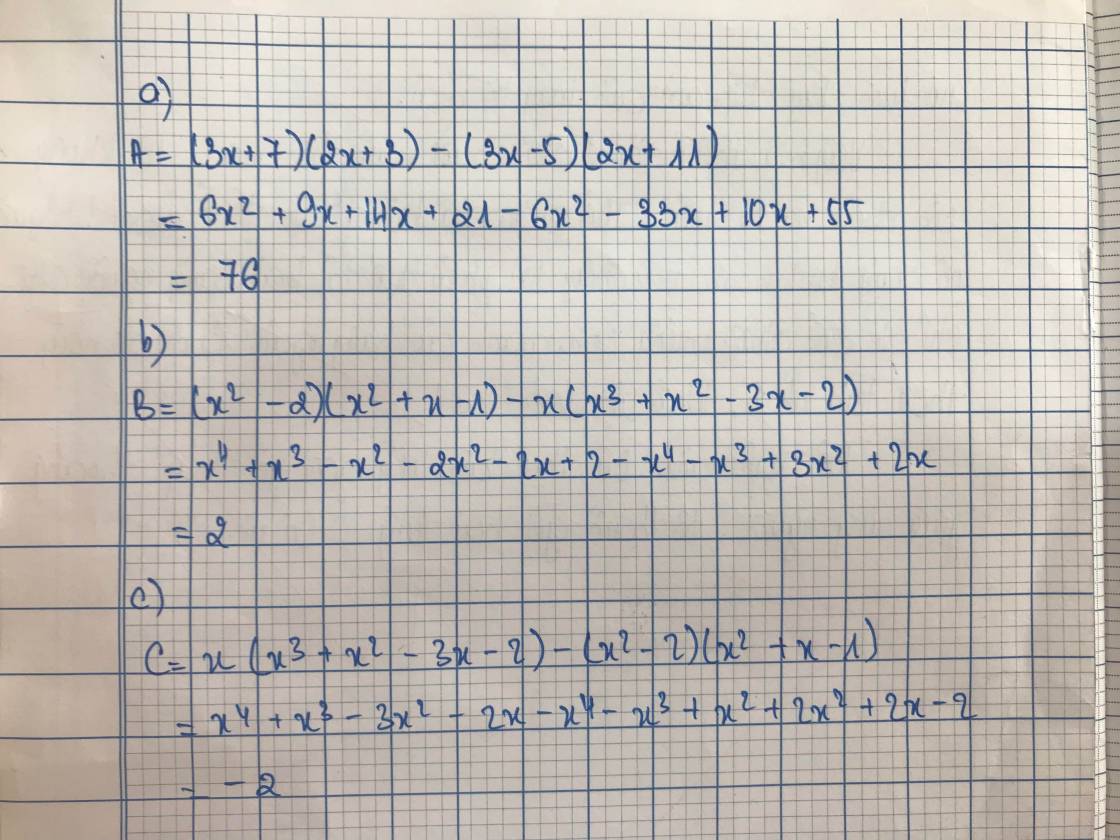Hãy nhập câu hỏi của bạn vào đây, nếu là tài khoản VIP, bạn sẽ được ưu tiên trả lời.

a: \(=-2x^2\cdot3x+2x^2\cdot4X^3-2x^2\cdot7+2x^2\cdot x^2\)
\(=8x^5+2x^4-6x^3-14x^2\)
b: \(=2x^3-3x^2-5x+6x^2-9x-15\)
\(=2x^3+3x^2-14x-15\)
c: \(=\dfrac{-6x^5}{3x^3}+\dfrac{7x^4}{3x^3}-\dfrac{6x^3}{3x^3}=-2x^2+\dfrac{7}{3}x-2\)
d: \(=\dfrac{\left(3x-2\right)\left(3x+2\right)}{3x+2}=3x-2\)
e: \(=\dfrac{2x^4-8x^3-6x^2-5x^3+20x^2+15x+x^2-4x-3}{x^2-4x-3}\)
=2x^2-5x+1

Sắp xếp lại các đa thức ta có:
\(A\left(x\right)=x^5+3x^4-2x^3-9x^2+11x-6\)
\(B\left(x\right)=x^5+3x^4-2x^3-10x^2+9x-8\)
a) Ta có: \(C\left(x\right)=A\left(x\right)-B\left(x\right)\)
\(=\left(x^5+3x^4-2x^3-9x^2+11x-6\right)-\left(x^5+3x^4-2x^3-10x^2+9x-8\right)\)
\(=x^5+3x^4-2x^3-9x^2+11x-6-x^5-3x^4+2x^3+10x^2-9x+8\)
\(=x^2+2x+2\)
b) \(C\left(x\right)=2x+2\)\(\Leftrightarrow x^2+2x+2=2x+2\)
\(\Leftrightarrow x^2=0\)\(\Leftrightarrow x=0\)
Vậy \(x=0\)
c) \(C\left(x\right)=x^2+2x+2=x^2+2x+1+1=\left(x+1\right)^2+1\)
Giả sử ta có: \(C\left(x\right)=2012\)\(\Rightarrow\left(x+1\right)^2+1=2012\)
\(\Leftrightarrow\left(x+1\right)^2=2011\)
Vì \(x\inℤ\)\(\Rightarrow\left(x+1\right)^2\)là số chính phương
mà 2011 không là số chính phương \(\Rightarrow\)C(x) không thể nhận giá trị bằng 2012 ( đpcm )

a: \(=x^2-2x-3x^2+5x-4+2x^2-3x+7=3\)
b: \(=2x^3-4x^2+x-1-5+x^2-2x^3+3x^2-x=4\)
c: \(=1-x-\dfrac{3}{5}x^2-x^4+2x+6+0.6x^2+x^4-x=7\)

a)P(x)=\(x^5-3x^2+7x^4-9x^3+x^2-\dfrac{1}{4}x\)
=\(x^5+7x^4-9x^3-2x^2-\dfrac{1}{4}x\)
Q(x)=\(5x^4-x^5+x^2-2x^3+3x^2-\dfrac{1}{4}\)
=\(-x^5+5x^4-2x^3+4x^2-\dfrac{1}{4}\)
b) P(x)=\(x^5+7x^4-9x^3-2x^2-\dfrac{1}{4}x\)
+ Q(x)=\(-x^5+5x^4-2x^3+4x^2-\dfrac{1}{4}\)
__________________________________
P(x)+Q(x)= \(12x^4-11x^3+2x^2-\dfrac{1}{4}x-\dfrac{1}{4}\)
P(x)=\(x^5+7x^4-9x^3-2x^2-\dfrac{1}{4}x\)
- Q(x)=\(-x^5+5x^4-2x^3+4x^2-\dfrac{1}{4}\)
_________________________________________
P(x)-Q(x)=\(2x^5+2x^4-7x^3-6x^2-\dfrac{1}{4}x-\dfrac{1}{4}\)
c)Thay x=0 vào đa thức P(x), ta có:
P(x)=\(0^5+7\cdot0^4-9\cdot0^3-2\cdot0^2-\dfrac{1}{4}\cdot0\)
=0+0-0-0-0
=0
Vậy x=0 là nghiệm của đa thức P(x).
Thay x=0 vào đa thức Q(x), ta có:
Q(x)=\(-0^5+5\cdot0^4-2\cdot0^3+4\cdot0^2-\dfrac{1}{4}\)
=0+0-0+0-\(\dfrac{1}{4}\)
=0-\(\dfrac{1}{4}\)
=\(\dfrac{-1}{4}\)
Vậy x=0 không phải là nghiệm của đa thức Q(x).

lu ngu